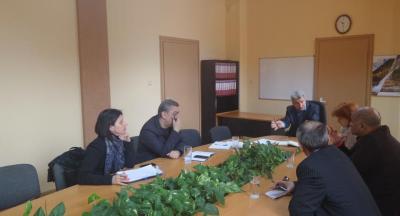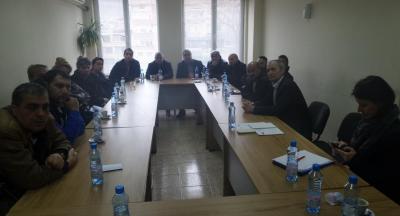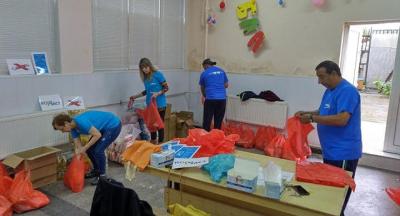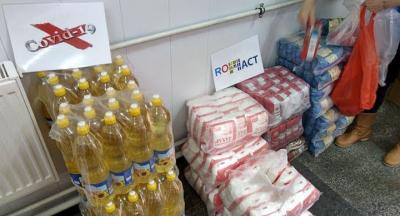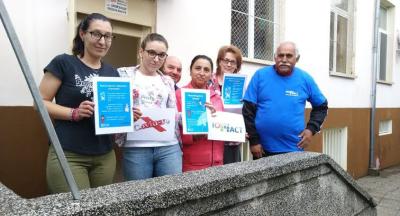Peshtera
*Disclaimer: The information and views set out in this page do not necessarily reflect the official opinion of the Council of Europe and/or the European Commission. Neither the Council of Europe, the European Commission nor any person acting on their behalf may be held responsible for the use which may be made of the information contained therein.
Located in southern Bulgaria, the town of Peshtera neighbours Batal and Bratsigovo in the Pazardzhik province. Peshtera is the third largest city in the area after Velingrad and Pazardzhik and the 45th largest in Bulgaria of the 244 cities in the country.
Peshtera is also the administrative centre of the municipality. There are several different ethnic groups in Peshtera, there are notable numbers of Turkish, Roma and Vlach ethnicity with ethnic Bulgarians making up the majority.
The Roma population is concentrated in two neighbourhoods of Peshtera, one of which is has mixed ethnicities. Some of the main issues Roma face in Peshtera are related to the lack of property title documents on illegally built houses which have been built on farmland and therefore are outside jurisdiction of urban planners. Local authorities continue to look for solutions to this issue.
Another very important problem is the low level of education among the Roma population. Poor education levels result in underemployment and a lack of opportunity for work. While this is not officially recorded, there is a clear connection between the lack of education and job opportunities for the Roma in our area.
One additional issue of concern for this group is the lack of health coverage and access to health services.
The ROMACT Process
The Community Action Group (CAG) – made up of Roma citizens and activists – was set up in September 2015. Shortly after, the municipality of Peshtera officially joined the ROMACT programme through the signature of a letter of commitment in November 2015.
The ROMACT process has been reinforced with the signature of the agreement letter in April 2023.
In April 2016, the municipality of Peshtera hired a new Roma staff member for the position of “Expert on ethnic and demographic issues”, and they are working closely with the CAG.
Then the CAG defined the following short-term and long-term priorities:
| Short-term priorities of the CAG | Objective 1 |
|---|---|
| Infrastructure | Provide a solution for the unpaid bills for water supply in the 2 Roma settlements |
| Housing | Provide alternative solutions for the people living in the 11 illegal houses that were demolished |
| Long-term priorities of the CAG | Objective 1 |
|---|---|
| Infrastructure | Inclusion of territories inhabited by Roma within the local urban planning |
| Health | Impose environmental norms on a local factory to prevent air pollution |
Since November 2015, the ROMACT National Support Team has assisted Peshtera authorities to tackle the most the most urgent issues (e.g. the eviction of 11 Roma families from illegally built houses). On the 6th April 2016, we held the first joint meeting of the CAG and the Local Authorities where solutions are discussed to address issues such as illegal housing.
The Municipality also took the opportunity of the first joint meeting to present the implementation of the Municipal Action Plan for Roma Inclusion (MAPRI). At the meeting 5 CAG members were appointed to monitor the implementation of the integration strategy. In January 2017, The Municipal Taskforce for Roma inclusion was created. In February 2017, the Municipal Action Plan for Roma Inclusion was updated upon approval of the Local Council.
Municipality staff benefited from ROMACT expert support in planning the implementation of short and medium term activities and to develop project proposal for addressing health needs of Roma.
The Municipality benefited of ROMACT expertise for the following projects :
The expertise provided by ROMACT for municipalities involves training and guidance on preparing project proposals and implementing inclusive policies aimed at improving the living conditions and social integration of vulnerable populations, including the Roma.
* Transfer of good practices for social inclusion of Brussels francophone public services in Peshtera - Funded by European Social Fund (ESF).
Budget : 70 000€
Status : rejected
* Strategy for community-led local development for the period 2017-2023 of non-profit organization Local Initiative Group - Funded by European Regional Development Fund (ERDF).
Budget : 2 605 317 €
Status: rejected
Trainings provided by ROMACT experts :
Local Authorities (LA):
* Participation in a public consultation of the Recovery and Resilience Plan of Bulgaria;
* Partnership management for planning and implementation of municipal policies for social inclusion;
* Monitoring & Evaluation of the Municipal Action Plan for Roma Integration;
* Information on procedure BG05SFPR002-2.003: “Future for the children” in Bulgaria;
* Social and Emotional Development and Language Culture through LEGO Education (training for teachers).
Community Action Groups (CAG):
* Legal frame for addressing discrimination;
* Participation in the municipal budgeting process;
* Understand and Participate in CLLD strategies.
Taskforce :
* Partnership management for planning and implementation of municipal policies for social inclusion;
ROMACT Small Grants Scheme :
ROMACT offers small grants scheme to support the efforts of the municipalities and Community Action Groups to respond together to the needs of the most vulnerable and to multiply the good practices across ROMACT municipalities.
Under the scheme of small grants, the following project was supported by ROMACT between April 2020 - May 2021:
Initiative to counter COVID19 pandemic – Municipality of Peshtera
ROMACT supported the municipality with 2652 €, reaching 140 disadvantaged families in Pirin and Lukovitsa neighbourhoods. The project mainly covered information campaign on COVID19 and provided masks, disinfectant products, informative flyers to raise awareness in Roma community. Essential food supplies were also provided for families with dire financial situation. Local community action group identified the vulnerable families who were adversely impacted by the pandemic and distributed the packages.

